 Photo by Ilse Ruppert
Photo by Ilse Ruppert
On June 4, 1981, West German band Xmal Deutschland took the stage at the Aladin Music Hall in Hamburg. Dressed in a bomber jacket and high-waisted black pants, singer Anja Huwe fronted the band and, according to a fan review on Ox Fanzine, “rarely [left] her place at the microphone.” Effortless and imposing, the members of Xmal Deutschland produced a raw avalanche of sound—music so ahead of the curve that now, 43 years after their release, two reissues of their first singles immediately sold out.
Inspired by the DIY ethic of British punk, Xmal Deutschland was founded in 1980 by friends Anja Huwe, Manuela Rickers, Fiona Sangster, Rita Simonsen, and Caro May. Speaking from her home in Hamburg, Huwe recalls how they came together. “When I was 17, I moved into this apartment in Hamburg’s red-light district,” she says. “I was kind of an art student and very much into punk music. I worked at a record store called Rip Off and had been in London, where I saw The Clash and The Slits. It was all very exciting.” By going to shows in Hamburg, Huwe met Rickers, Sangster, and May. “We had friends and boyfriends who played in bands too, and we thought: ‘It’s DIY, everyone can play in a band if they want to, even if they don’t play an instrument. So let’s have a band.’” The band took its name, Xmal Deutschland, from a famous book by a communist activist and journalist named Rudolf Leonhard. “We all read lots of books, Fiona’s family were teachers, my father was a journalist, and my grandmother wrote poetry,” says Huwe. “We all came from very intellectual families.”
Although, in Huwe’s words, Xmal Deutschland were “a rehearsal room only” band at first, they quickly found themselves in the studio, slated to record their first single, “Schwarze Welt,” for underground label ZickZack. When vocalist Rita Simonsen didn’t show up to the session, Huwe, who had been playing bass, stepped up. “Everyone was looking at me and saying, ‘Now it’s you, you are the one.’ So I had no choice, I had to!” Despite her compelling voice, Huwe did not want to be the band’s singer. “They made me go onstage, which wasn’t fun. I didn’t want to be a pop star. I wanted to be part of a group and write music,” she explains. “Well, writing wasn’t really the case. In those days, it was more like making up some songs, in a way.” This loose approach to music making, along with bold clouds of teased hair, self-made clothes, and thick eyeliner, gave the group an instant edge. With a heavy synthesizer line, rabid electric guitar, and the spirit of the New German Wave—which combined punk rock, new wave, and gothic sensibilities—“Schwarze Welt” is both powerful and raw.
Huwe’s new role as a front-person aligned perfectly with her interests away from a microphone. “To me, the whole movement was about fashion,” she says. “It was about art. It was about music. When I started getting into the scene, I had long blonde hair and everyone said ‘You could easily work as a model, go to Paris.’ But I always thought, ‘No, this is not what I want.’” Fortunately for Huwe, the answer was in London fashion, where women embraced short hair and carried themselves with a defiant, anti-establishment attitude. “The very first time I was in London, in ‘79, or ‘80, I went to King’s Road and bought a few clothes from a shop,” recalls Huwe. “There were two people sitting behind the counter, and they were much older than us; it was Vivienne Westwood and Malcolm McLaren.” Tattered muslin shirts, metal clasps, harnesses, and erotic prints were, at that time, more than just a gesture of provocation: they represented the possibility of a life outside the confines of pre-established societal roles. “It was against all the classic roles of being a woman,” says Huwe. “I didn’t want to marry, I didn’t want to have kids, I wanted to be myself, to be a person and develop, and it was the age to do it.”

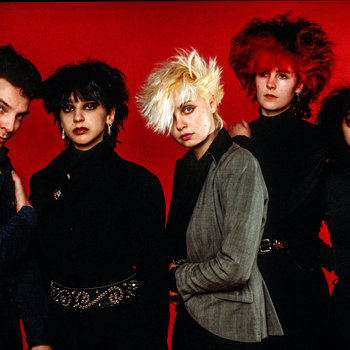
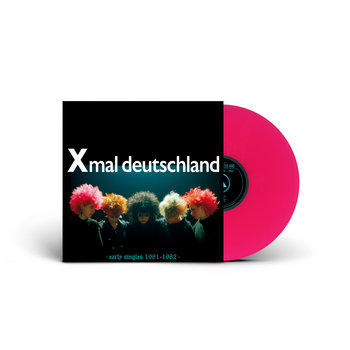
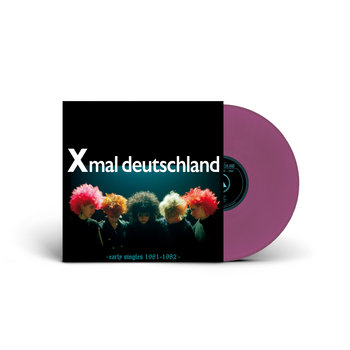
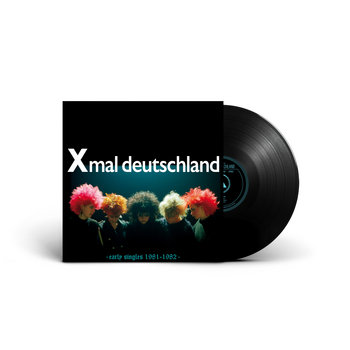
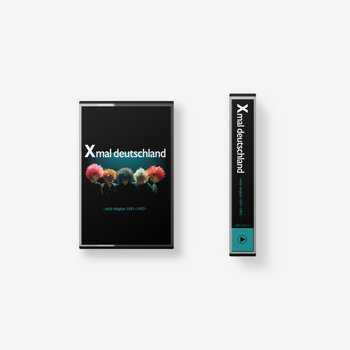
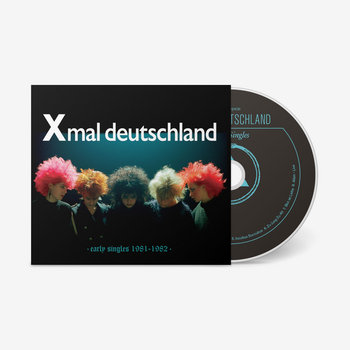

Vinyl LP, Cassette, Compact Disc (CD)




That defiance is present in songs such as “Die Wolken” and “Kälbermarsch.” Low, breathy frequencies, oscillations, menacing riffs, and dirge-like drums combine with Huwe’s cryptic poetry. Images of colors, fire, death, and terror populate Xmal’s songs. “German is a very complex language, so it’s easy to have an idea and use different words,” explains Huwe. “I use a lot of metaphors and unusual, old-school words. I pick up words that make sense to me, and maybe not to others, to create my own poetry without using the general wording.” The band’s creative approach appears fully crystalized on “Incubus Succubus,” a memorable post-punk chant that evokes contemporaries such as The Birthday Party and Malaria!
“Incubus Succubus” helped the band solidify the attention of German audiences and, with only seven or eight finished songs, Xmal Deutschland went on tour with fellow scene collaborators D.A.F. The tour not only allowed the group to polish their playing: For Huwe, it was also an informal lesson on how to manage being onstage every night. “I had the possibility to watch them and see how they reacted and acted towards the audience,” explains Huwe. “You have to learn how to communicate or bring things across.” From playing small and mid-size rooms in Germany, Xmal Deutschland quickly found themselves opening for Cocteau Twins in London. It was their first gig in the UK, to an audience of around 1,000 people. “It was like we say in German, like tasting blood, in a way. Like a drug,” says Huwe. “That was the moment where I learned how to perform, and how to get things across to the audience without talking—just by being us.” Because the group sang only in German, their distinctive sound wall sound, sharp image, and Huwe’s commanding presence became tools that aided them in reaching out to English-speaking audiences.





Vinyl LP, Cassette, Compact Disc (CD)




By 1983, Xmal Deutschland was on a rapturous ascent. Signed to legendary label 4AD, the band began recording their debut album, Fetisch, at Blackwing Studios, a converted church that hosted artists from both 4AD and Mute Records. “It was pretty exciting, especially because there were rehearsal rooms too, and all these bands were rehearsing, like Depeche Mode, Blancmange, and Yazoo,” says Huwe. “It was hard work, I was the very last one to record my stuff, and it was a lot of pressure, you had to be louder, and you have to be present.” Shepherded by producer and label head Ivo Watts-Russell, with a lineup including bassist Wolfgang Ellerbrock and drummer Peter Bellendir, Xmal Deutschland moved forward. Their second album for 4AD, Tocsin, was released in 1984 to critical acclaim. A U.S. tour followed, but despite fitting in perfectly at venues like Danceteria in New York, the group struggled to find their place with other audiences. “We felt like aliens, you know? I mean, these girls singing in German at this beer bar. It was crazy,” laughs Huwe. Constant travel and work began chipping away at the group’s original aim. “When we started being in the band, it was fun to write songs, and to have a good time being friends, you know?” says Huwe. “But then, after the second album, we had to make a decision to be signed by a major company, which we did, we signed to Phonogram. But that’s when the pressure started.”
After two releases with 4AD, the band felt it made sense to find a new home. “It’s hard to say but I think 4AD was into us being an art-y band, more mysterious, Wire-ish, and for us it was more important to get into songwriting,” says Huwe. Sadly, on Phonogram, the group’s ethos and artistic search became obscured by bureaucracy, commercial aims, and a roster of British artists with whom they could not compete. Committed to singing in German, Xmal Deutschland did not budge at the label’s insistence to become something they were not. “The pressure was really tough. They were saying ‘We spent money on you, and you have to think this is a job now,” says Huwe. “We didn’t have a manager, we were playing bigger and bigger places, and to be honest, it wasn’t fun anymore.” At the same time the band started to slowly crumble, the label offered Huwe a solo career, which she promptly turned down. “It was a constant fight, we had conversations about things, and there was no natural development anymore,” says Huwe. “The whole system collapsed in a very natural way, after so many years of being together.” An unintentional parting gift, “Matador,” from the band’s penultimate album, Viva, is a perfect ‘80s song: all tight riffs, synth accents, and romantic darkwave appeal. Putting an end to their charmed 10-year run, Xmal Deutschland broke up in 1990.
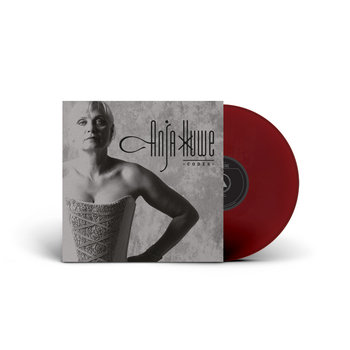
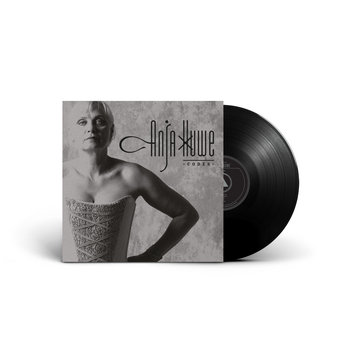


Vinyl LP, Compact Disc (CD)




“I achieved so much more than I ever expected. We played the U.S. twice, and Japan and Europe,” says Huwe. “But it was tough, after being together for so many years, being friends. You lose everything, and have to find new ways.” After Xmal Deutschland, Huwe developed a prolific practice as a painter and visual artist. She did not sing again until, to everyone’s surprise, she announced her first solo album, Codes.
At some point in the recent past, the former members of Xmal Deutschland, in Huwe’s words, “got back together and talked about things” as naturally as they had parted ways decades before. Ever friends and collaborators, Huwe invited Rickers to add her guitar sounds to the tracks on Codes. “We worked on this constantly for a long time,” reflects Huwe, “and the funny thing was that when I started singing again, it was better than before.”







